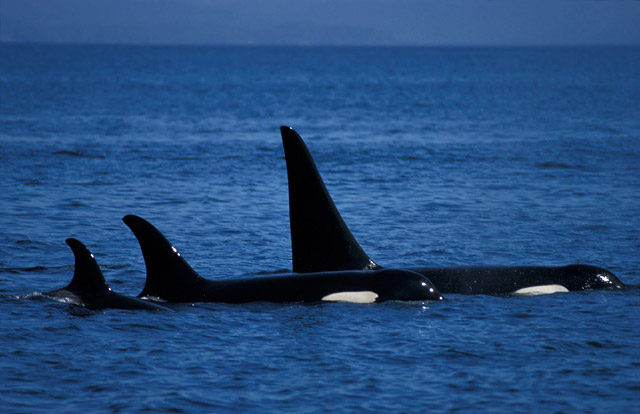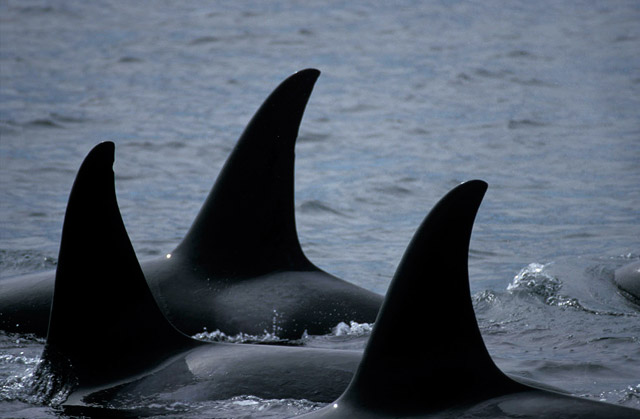| |
| Am 7. Dezember 2010 fällte der Kanadische Bundesgerichtshof ein denkwürdiges Urteil mit weitreichenden Konsequenzen für den Schutz der Lebensräume bedrohter Meerestiere – nicht nur der bedrohten Orcas. Neun Umweltschutzgruppen hatten zusammen mit der Organisation Ecojustice vor Gericht gegen das Kanadische Fischereiministerium (Department of Fisheries and Oceans, DFO) und das Umweltministerium geklagt, da diese es bislang sträflich unterlassen haben, die Lebensräume der gefährdeten und vom Aussterben bedrohten Orcas entlang der Küste von BC zu schützen. Das Gericht gab den Umweltschutzgruppen Recht und nun ist das DFO gerichtlich dazu gezwungen, endlich selbst die kanadischen Umweltschutzgesetze einzuhalten und diese Lebensräume zu schützen. |
| Die Population der südlichen Orcas (southern residents) besteht nur noch aus 87 Tieren, die in drei Familienverbänden leben. Diese Population gilt bereits als vom Aussterben bedroht (endangered). Nach dem kanadischen Species at Risk Act (SARA) ist eine „endangered species … a wildlife species that is facing imminent extirpation or extinction“. Die Population der nördlichen Orcas (northern residents) umfasst noch etwa 220 Tiere und gilt als bedroht (threatened). Gemäß dem SARA ist eine „threatened species … a wildlife species that is likely to become an endangered species if nothing is done to reverse the factors leading to its extirpation or extinction“. Richter James Russell urteilte u. a., dass „the minister of fisheries and oceans erred by law in determining that the critical habitat of resident killer whales was already legally protected by existing laws of Canada“. |
| |
 |
| Orcas (Orcinus orca) © Klaus Pommerenke, www.bears-and-more.de |
| |
| Das Gericht fällte eine Grundsatzentscheidung, die nicht nur eine schallende Ohrfeige für die Untätigkeit des DFO und seiner verfehlten Fischereipolitik darstellt, sondern auch weitreichende Konsequenzen für den Artenschutz bedrohter Meerestiere allgemein hat. „This is a victory not just for the resident killer whales, but for more than 90 other marine species listed under the federal Species at Risk Act“, sagte Margot Venton von Ecojustice. „The court has confirmed that the government must legally protect all aspects of critical habitat from destruction. Now DFO needs to obey its own law.“ „Kritischer Lebensraum“ ist definiert als der Lebensraum, den gefährdete oder vom Aussterben bedrohte Arten benötigen, um zu überleben und um ihre bereits dezimierte Population wieder herzustellen. „The abundance of salmon, chemical pollution and physical and acoustic disturbance have all been identified as key threats to the critical habitat of resident killer whales. The court has confirmed that DFO is legally required to protect these features. Considering the whales in fishing plans is a first step towards this implementation“, erklärte Misty MacDuffee von der Raincoast Conservation Foundation. „We have to start thinking of wildlife in our salmon-management plans, whether it’s bears, wolves or killer whales … This is where the rubber is going to hit the road because DFO doesn’t actually want to give up fish to wildlife.“ Gemäß dem jetzigen Gerichtsurteil wären z. B. in Jahren, in denen nur wenige Hundslachse zum Laichen in die Flüsse entlang der Küste zurückkehren, nicht mehr den möglichst hohen Fangquoten der Fischerei Priorität einzuräumen, sondern den Orcas, die sich zu dieser Jahreszeit von den Lachsen ernähren. |
| „Habitat for the whales includes the water around Vancouver Island and, as lack of salmon, pollution and noise have been identified as the main threats to killer whales, protection could affect fishing, whale watching, disposal of toxins and sewage, military sonar and seismic testing … Research from the University of Victoria’s VENUS-Victoria Experimental Network Under the Sea – project released last week showed whales are having to yell over increasing noise from marine traffic“, schrieb Judith Lavoie am 8. Dezember im Times Colonist (Ottawa isn’t protecting whales: judge). Das Gericht urteilte, dass das DFO gegen Gesetze verstoßen hatte, weil es wichtige Kernelemente des kritischen Lebensraumes für Orcas wie die Verfügbarkeit von Nahrung, Beeinträchtigungen von Unterwasserlärm und andere Faktoren sträflich ignoriert habe. 2008 hatte das DFO eine Stellungnahme abgegeben zum Orcaschutz, in der lediglich freiwillige Richtlinien und gesetzlich nicht bindende Grundsätze formuliert wurden. 2009 erließ die kanadische Regierung zwar halbherzig eine Verfügung zum Schutz kritischer Orca-Lebensräume, wichtige biologische Aspekte wie Wasserqualität, Nahrungsquellen oder Unterwasserlärm wurden jedoch nicht berücksichtigt. Das Gericht urteilte jetzt, dass freiwillige Protokolle und Richtlinien nicht ausreichend sind, um kritische Lebensräume zu schützen und verlangt rechtsverbindliche Nachbesserungen. |
| „It remains to be seen what steps DFO will take to protect killer whale habitat, but immediate action is necessary“, erklärte Stephanie Goodwin von Greenpeace. „With the Canadian government currently considering a proposal for oil supertankers through critical habitat, B.C.’s killer whales need the government to take action today to ensure they have salmon to eat, clean water to live in, and protection from noise pollution and physical disturbance.“ Das bahnbrechende Grundsatzurteil des kanadischen Bundesgerichtshofs vom 7. Dezember 2010 (Federal Court, The Honourable Mr. Justice Russell, Date: 20101207, Docket: T-541-09, Citation: 2010 FC 1233) ist über die Website des Sierra Club BC (www.sierraclub.bc.ca) allen Interessierten online zur Verfügung gestellt (Sierra Club BC -> Breaking News: The Orca Won! -> See the entire federal court judgement). |
| |
 |
| Orcas (Orcinus orca) © Klaus Pommerenke, www.bears-and-more.de |
| |
| Eine Zusammenfassung der aktuellen Bedrohung der Orcas, die entlang der Küste von BC leben, gibt der nachfolgende englische Text, welcher dem „backgrounder“ der Pressemitteilung des Sierra Club BC vom 07.12.2010 entnommen ist (Decisive killer whale court win offers hope for at-risk species): |
| |
| Threats to killer whales |
| |
| Declining salmon stocks |
| Whales needs to eat, and they rely on large, fatty Chinook salmon once abundant in B.C.’s coastal waters. Poor Chinook returns translate into increased whale mortality, for example, population drops in both species in the mid-late 1990s and early 2000s. |
| |
| Physical and acoustic disturbance |
- Noise pollution makes it harder for the whales to locate and hunt for fish.
- Dredging, drilling, construction, seismic surveys, and military sonar impact the acoustic environment. There is growing evidence that underwater noise can disrupt whale behaviours, cause physical injury and render habitat unsuitable for marine mammals.
|
| Toxic contamination |
- Whales are vulnerable to the accumulation of high levels of persistent organic pollutants (POPs) because they are long-lived animals that feed high in the food chain (that is, they eat prey that have also accumulated these pollutants in their systems).
- Recent study indicates Chinook salmon, the whales’ principal food source, are contaminated with PCBs, flame retardants and other persistent chemicals retained in body fat.
- Because of their small population sizes B.C.’s whales are particularly vulnerable to catastrophic events, such as oil spills.
|
| Heightened concern because of potential increased oil tanker traffic along the coastline |
| Whales do not appear to avoid oil spills and can easily fall victim to the inhalation of petroleum vapours. Exposure leads to dramatic population declines and poor fertility (e. g. Alaskan killer whales in aftermath of Exxon Valdez spill). |
| |
| To survive, the whales need: |
| |
| Protection of Chinook stocks in the whales’ critical habitat |
- Salmon allocation for whale must be part of the fisheries management process.
- A marine environment legally protected from excessive noise pollution.
- Ambient quality of the marine environment must be monitored and understood.
|
| Better protection from pollution |
- Critical habitat must be protected by stronger laws that help lower the already significant load of chemical pollutants found in the whales’ critical habitat.
- Critical habitat must from the threat of a catastrophic pollution event such as an oil spill. This is especially critical given that oil tanker traffic along B.C.’s coastline may increase in coming years.
|
| DFO must deliver the terms of the whales’ recovery strategy, finalized in March 2008 |
| DFO should consult with expert recovery team of government and independent scientists already assembled to assist in the recovery of this iconic animal. |
| |
 zurück zurück |

